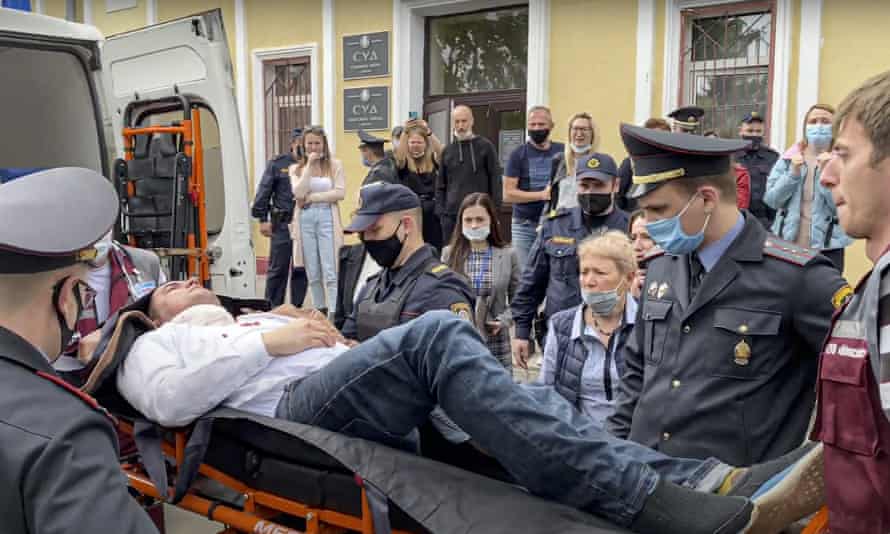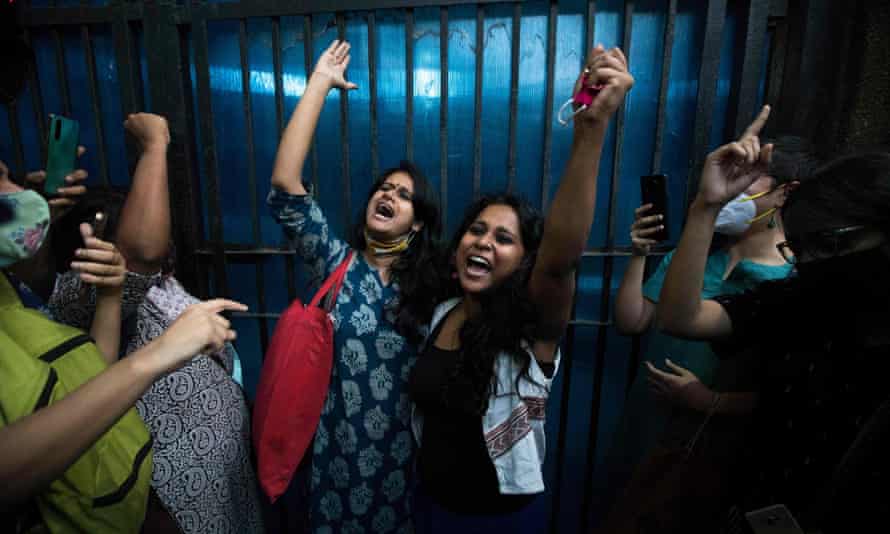In India, the author of a viral poem about Narendra Modi’s handling of Covid-19 has been demonised. But all around the world, from Myanmar to Belarus, poets are being persecuted
Tishani Doshi for The Guardian
Mon 5 Jul 2021 03.00 EDT

Police officers and paramedics carry Stepan Latypov, after he stabbed himself in the neck with a pen during a court hearing on 1 June. Photograph: AP
Dictators know the power of the spoken word. Many of them wrote poems – Stalin, Mao and Radovan Karadžić (whose work was published in a Slovakian magazine). Saddam Hussein made gifts of verse to the American soldiers guarding him in his final years. Other dictators dabbled, but were mainly inspired. Pol Pot recited Verlaine. Mussolini venerated Gabriele d’Annunzio. Still others banned poetry from their republics. After Augusto Pinochet’s death, it was discovered that he had one of the largest libraries in Latin America, with more books in it than the number of people he’d had tortured; poetry and fiction, though, were negligible. Regardless of their poetic affiliations, dictators sense the danger of poetry, which is why poets in their regimes are routinely imprisoned, tortured, killed or forced into exile.
In 1964, the 23-year-old Joseph Brodsky was put on trial in Leningrad for social parasitism. During this time in the Soviet Union, all able-bodied adults were expected to work till retirement. Over the course of two hearings recorded by Frida Vigdorova, a judge harangues Brodsky; tells him to stand straight, look at the court, stop taking notes. The judge does not seem to believe Brodsky when he says: “It’s work to write poems.” He wants to know what Brodsky’s regular job is, can he support his family with this income, how is he being useful to the motherland? Over and over, the judge refers to his “so-called poems”. “Why do you say my poems are so-called poems?” Brodsky asks. “Because we have no other impression of them,” the judge replies.
Reading the transcript, it appears that Brodsky bristles more about the dismissal of his poems as “so-called” than the label “parasite”. Poets are sensitive and critics can be harsh. One UK publisher wrote Gertrude Stein a rejection letter parodying her style: “Being only one, having only one pair of eyes, having only one time, having only one life, I cannot read your MS. three or four times. Not even one time.”
The Gujarati poet Parul Khakhar recently received a similar dressing down about her now viral poem “Shav-vahini Ganga” (Ganges, the Carrier of Corpses), in an editorial published in a government-funded journal. It describes her work as “pointless angst expressed in a state of agitation”, going on to say: “Such people want to quickly spread chaos in India … they have jumped into literature with dirty intentions.” Khakhar’s poem is a 14-line lament for the deaths during India’s second wave of the coronavirus pandemic. She writes how there are no more spots in the crematoria, how India is out of pallbearers, mourners, tears. Narendra Modi, the prime minister, is not addressed directly, but the accusation is implicit: “O King, this entire city has at last seen your real face /… O King, in your Ram-Rajya, do you see bodies flow in the Ganges?”
Khakhar reportedly wrote the poem because she was distressed by the sight of dead bodies floating in India’s holiest river. In April the government decided to bring forward the Hindu festival Kumbh Mela that takes place every 12 years because the astrological configuration for 2021 was deemed more auspicious. Over nine million pilgrims thronged to the Ganges, mostly unmasked, creating the biggest superspreader event in the history of the pandemic. Since early May heavy rains have caused hundreds of corpses wrapped in saffron cloths to wash up on the river banks, some dug from shallow graves by dogs.
Khakhar’s poem and the subsequent editorial, titled “No, This Is Not a Poem, it is Misuse of a ‘Poem’ for Anarchy”, have divided India’s artistic community. Some have questioned Khakhar’s sudden foray into the political, others have said the poem is hardly a masterpiece. More than 150 people have signed a statement asking the magazine to withdraw its editorial, stressing the right to debate contemporary issues through poetry as an important part of a healthy democracy. Khakhar, who has been relentlessly trolled for being “anti-national” and a “demoness”, has locked her Facebook profile and refused interview requests, choosing instead to answer with a new poem: “You Will Not Speak”.
Under Modi’s leadership indictments of sedition have jumped 165%. India is a dangerous place for poets and artists to be
The question of what makes a poem a poem is something that the entire history of literary criticism still hasn’t been able to answer. Because a poet’s entire career can be judged on a single poem floating around social media, it’s easy to knock it down. The late Adam Zagajewski, in his essay “Against Poetry”, writes about the uselessness of poets like Shelley writing defences of poetry (which his own essay, of course, also comes to be). “Poets live like the defenders of a besieged citadel, checking to see whether the enemy is approaching and where he’s coming from,” he writes. “This isn’t a healthy way of life.”
Zagajewski believed there were two aims of lyric poetry. The first is the need to provide forms for our inner life; the second is to be on watch for history, to stand guard “on the square before the presidential palace, reflecting on the gradual or rapid metamorphoses of our civilisation”. He acknowledges that poets aren’t above suspicion: “Why did Brecht serve Stalin? Why did Neruda adore him? Why did Gottfried Benn place his faith in Hitler for several months?”
“The purpose of poetry is to remind us / how difficult it is to remain just one person,” Czesław Miłosz tells us in “Ars Poetica?”. Khakhar went from being a Modi enthusiast to calling him an emperor with no clothes. Brecht’s support of Stalin’s show trials is unforgivable but it has not stopped us from endlessly quoting him during this pandemic about how in the dark times there will be singing about the dark times. Poems don’t murder people. Dictators do. But poetry brings us close to death, demands that we witness, take stock.

Activists Natasha Narwal, centre left, and Devangana Kalita shout slogans after being released from Tihar jail, Delhi, last month. Photograph: Xavier Galiana/AFP/Getty Images
Some poets even speak to us from the place beyond death. Miklós Radnóti wrote his final poems before being marched through a Hungarian forest in 1944. He was shot in the head and his body was later exhumed from a mass grave, identified by the papers he was carrying – civil identity card, certificate of baptism, letters and a small notebook with his poems. “I write, what else can I do? A poem is dangerous, / and if you only knew how one whimsical, delicate line, / even that takes courage…”
Khakhar’s poem was called an “unnecessary incitation”, but poetry has always been about unearthing. Whether it’s Seamus Heaney’s “squat pen” digging his ancestral bogs, or Faiz Ahmed Faiz digging diamonds from every peak “for blood that was spilt, for gardens laid bare”, or Mahmoud Darwish dreaming of peace, “returning to dig up the garden / to plant all the crops we will plant,” or Paul Celan digging with black earth under his fingernails, digging away at time, at history, “O you dig and I dig, and I dig towards you.”
All that digging is hazardous. Nâzım Hikmet spent almost two thirds of his adult life in prison and exile. Federico García Lorca was assassinated by fascists for daring to write about the carnage of Franco’s Spain. Wole Soyinka was accused of conspiring with Biafran rebels and imprisoned in solitary confinement for two years without reading or writing materials. The recent roll call of incarcerated poets is long and varied – Dareen Tatour, Tran Duc Thach, Stella Nyanzi, Ahnaf Jazeem, Varavara Rao, İlhan Çomak, Ashraf Fayadh. Myanmar’s latest military coup has imprisoned more than 30 poets and killed four. Uighur poets continue to be held in Chinese internment camps. Russian intelligence has been suspected of trying to poison a poet, and in Iran, poets have been flogged for “spreading propaganda” and “insulting the sacred”. All this state terror culminates in a single image for me: Belarusian activist Stepan Latypov stabbing himself in the neck with a pen during his trial in Minsk.
Modi is also a poet. In 2014 he published A Journey, which one reviewer described as poignant, the speaker of the poems “a genuinely sympathetic figure”, albeit a lonely one – “Is there a companion to share / These emotions that build behind the padlocked door.” Modi certainly seems adrift. Since India’s second Covid wave he has emerged to address the nation only twice. Official figures at the time of writing put the death count at 393,338, although the New York Times reports a worst-case scenario closer to 4.2 million. Under Modi’s leadership indictments of sedition have jumped 165% and cases of the egregious Unlawful Activities (Prevention) Act, which is deployed to target anyone who criticises the government, have increased by 33%. India is already ranked the most dangerous country in the world for women, and has just moved up the charts of most dangerous place to be for journalists. Poets and artists are close behind.

‘Poems don’t murder people; dictators do’ … Tishani Doshi. Photograph: Sarah Lee/The Guardian
Two weeks ago, the Caravan magazine published a series of letters written by Devangana Kalita and Natasha Narwal, doctoral students and activists, who were incarcerated for over a year in Delhi’s Tihar jail on charges of rioting and attempted murder. Their letters, to the women’s collective to which they belong, travel from hope to rage to resistance to love. They write about their inmates, the hours when they’re allowed outside their wards, the ongoing farmer’s protests, the arrival of seasons – “Those fiery red flowers must be bursting through the city’s skyscrapers?” I’d call them postcard poems, but does it matter? The right to dissent is worth any number of so-called poems.
Charles Simic’s poem, “Baby Pictures of Famous Dictators” offers us a series of grainy snapshots. Streetcars drawn by horses, women with parasols, infants in sailor suits posing for the camera in gardens of modest white-fenced homes – “Loveable little mugs smiling faintly toward / the new century. Innocent. Why not?” The poem turns quickly and devastatingly with a quivering wind of premonition. After squinting at the stars they are “carried off to bed by their mothers and big sisters, / While the dogs remained behind: / Pedigreed bitches pregnant with bloodhounds.”
I come back to Brodsky’s defiance during his trial, and I think perhaps, yes, the poet is a parasite after all. A flea that attaches herself to the bloodhound, irritating it by spreading news of its atrocities, clinging to its skin tenaciously, causing discomfort, and maybe even its downfall. I think of poet Anna Akhmatova, standing for 17 months in a line outside a prison in Leningrad during the Yezhov terror for a glimpse of her son. How one day, a woman hearing her name, asked in a whisper, “Can you describe this?” Akhmatova saying: “I can.”
